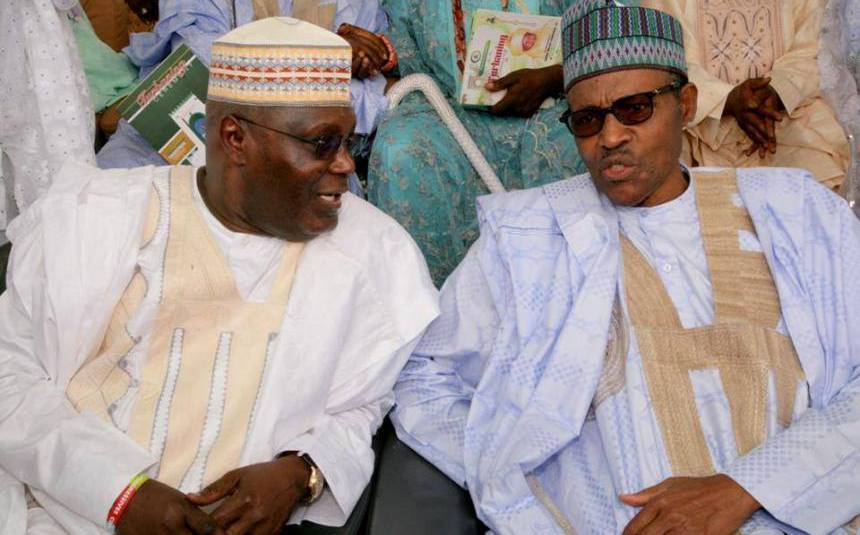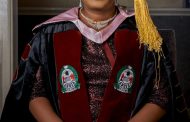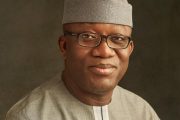Both Atiku Abubakar and President Muhammadu Buhari of the People’s Democratic Party, (PDP) and the All Progressives Congress, (APC) respectively are tapping into the cultural cum value space of the North East, the emergent battlespace in the 2019 presidential contest. So, far, the two are the leading candidates and might remain so to the last unless a surprise realignment of forces takes place in mid flight. The PDP fired the first shot in centralising the geopolitical calculus in the impending contest when a member of its Board of Trustees told a national newspaper not long ago that the North East would not abandon its own to vote for anyone else. In plain language, that was saying that Atiku Abubakar would get the most votes in the region, being ‘a son of the soil’. In apparent response to the statement which is understood to have unsettled Atiku’s contenders, APC leaders met in Bauchi over the weekend declaring Buhari to be the ‘kinetic entity’ of the region and to whom they would deliver the region, come what may, in February 2019.

Engineer Abba Gana, Member, PDP BOT says Northeast will not abandon Atiku
These declarations effectively mark the revival or resurgence of the Northeast as the ultimate battleground of the 2019 presidential contest vis-a-vis the prospects of the region’s return to the primacy it had before its experience of what now looks like an eclipse after the First Republic. In that Republic, it not only had the Prime Minister in the person of Abubakar Tafawa Balewa, it also had the then all powerful Minister for Defence, Muhammadu Ribadu. There was also Sir Kashim Ibrahim, the governor of Northern Region as well as another all-powerful state official, Sule Katagum who was for a long time the Chairman of the Civil Service Commission until Murtala removed him in 1975. Others include a technocratic crew of the likes of Ahmed Talib, Zanna Bukar Dipcharima, Shettima Ali Monguno – the University of Edinburgh educated first President of OPEC; Ahmed Joda who is still active as to attend a recent occasion at Obasanjo’s farm in Ogun State; Musa Daggash, Ibrahim Damcida, Aliyu Mai-Borno and Musa Bello, the father of the current Minister of the FCT and President Buhari’s representative at the turbaning of Atiku Abubakar as Wazirin Adamawa last Sunday, suggesting how history and value determine how these choices are made.
Still on the Northeast, its intellectual crew boasts of the likes of the mathematical wizard, Prof Iya Abubakar, Dr Mahmud Tukur, the leading voice in the thesis of values and leadership in Nigeria and, of course, the late Ibrahim Tahir. There were still others such as Prof Kyari Tijani, the University of Maiduguri Political Scientist who was, for decades, a member of the Editorial Board of The Guardian and then the equally late Prof Nur Alkali, the Historian of Cities, (London, Rome, Vienna, etc). This is not to talk of several wealthy businessmen and women as well military officers with legacy, unarguably signified by names such as the late Zakari Maimalari, Muhammadu Shuwa and TY Danjuma.
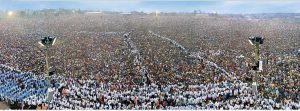
This is a 2015 Buhari rally, most likely Kaduna in the Northwest

Can he mobilise his own Buhari rally in the Northeast?
Expanding from four out of the 13 provinces in the old Northern Region, (Borno, Adamawa, Bauchi and later, Sardauna) to its present six states, (Adamawa, Bauchi, Borno, Gombe, Yobe, Taraba), the Northeast is Nigeria’s gateway to the world on the northern frontier. Borno State, for instance, connects directly to Benin, Cameroon, Chad, Niger and, by implication, the vast Sahelian region generally regarded in the language of a global power as an ungoverned space where poverty and terrorism mix into a combustible brew. Northeast as battleground in 2019 presupposes that the Northwest where Buhari is said to have 12 million voters personal to him will not be as hot as the Northeast where Buhari has to fight for votes against a ‘son of the soil’ in the person of Atiku Abubakar.
Apart from the APC and PDP framing of the territory so far, other activities are taking place. One is the turbaning of Atiku last Sunday, an occasion which must have given him much needed attention, providing opportunity for him to re-register in the people’s mind different from being just a politician and money man to also being a traditional ruler in a cultural space where that title has its symbolism – Prime Minister and Second-in-Command in the Emirate Council headed by the Lamidon Adamawa. Traditional Political Science has not been as successful as social constructivists in understanding how such ‘social facts’ translate to power resource for modern elite even in the most industrial societies in the world. In the case of Atiku, he is tracing and tapping into the cultural legacy of the Northeast by symbolically positioning himself as the arrowhead in the title of Wazirin Adamawa.
How this will translate to de-campaigning Buhari in the culturally complicated Northeast is what remains to be seen. Atiku is on top of the game of politics, he has resources, he has a vast network and he has been long in it – from being among the top three contenders in the presidential contest in the Social Democratic Party, (SDP) in 1993 to being the Vice-President for 8 years, four out of which he was really effectively in government and in power. Before 1999 – 2007, he had contested governorship in 1991. It was inconclusive and he was disqualified along with eight or so others. It was only in 1999 he won governorship at last before his elevation to Obasanjo’s deputy.
President Buhari, on the other hand, has incumbency advantages as well as his own cultural and ideological links to the Northeast. He no longer lacks money or people with money to fund his campaign although the fear is that the cultural complexity and elite indisposition to him in the region will play out in the election.
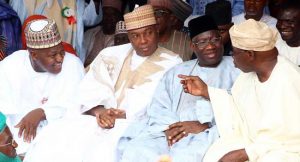
Obasanjo at Atiku’s turbanning, says Atiku won’t disappoint Nigerians
Ideologically, all two candidates are hardly distinguishable. President Buhari who used to be a statist is now a neoliberal convert, concessioning and public-private partnering like hell. Atiku who was, at one point, quoting profusely from Lee Kuan Yew has stopped doing so now. Not only has he stopped, he released a highly consensual and managerialist campaign document that has shocked many in terms of how light the leading elite take the Nigerian crisis. It is not clear if that is what might have alarmed Obasanjo, for instance, to say last Sunday that Atiku will not disappoint. What has commonly been heard is how aides considered to be sycophantic and incompetent have contributed the most to the unmaking of Buhari. Has Atiku Abubakar immunised himself against shallow and ideologically unclear experts who employ models they do not understand the normative undertone?
It is still a waiting game how the battlespace will finally unfold.

